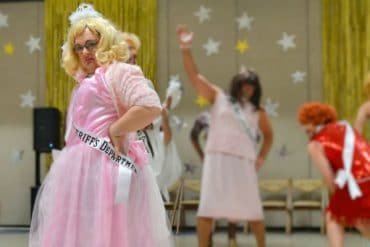Olympic fencer Jed Dupree challenges Nantucket to a duel this July
Flashback to March 26, 2001, in Kenosha, Wisconsin. Summer resident Jed Dupree had finally made it into the NCAA fencing semifinals after three disappointing years of coming up short for the Columbia University Lions. He was facing off against Stanford’s two-time NCAA champion Felix Reichling, a German prodigy whom many considered the best fencer in the world. The underdog Dupree had fought his way back to tie the bout up at fourteen to fourteen. Next point would decide the match. In the final sequence, Reichling came out on the attack. Dupree dodged his blade, and then in a decisive moment that would change his life, he pounced and struck Reichling in the chest for the win. Dupree went on to become a NCAA Champion, a National Champion and an Olympian. As for the fate of Felix Reichling, the great German competitor never fenced again.
Some might say that Jed Dupree had a violent childhood. While most kids were sticking straws into their juice boxes come lunchtime, little Jedediah was trying to stick opponents with a steel sword. Dupree picked up the fencing blade at the age of six, and by nine years old his mother was taking him out of school every afternoon to drive two hours from their hometown of Bethlehem, Pennsylvania, to a training facility in New York City. Under the tutelage of Columbia University’s head coach, Dupree was shaped into a national champion. After college, he rep- resented the United States in the Summer Olympics, first as a competitor in Athens and later as a coach in London. Today, he coaches the Harvard Crimson fencing team, and they are at the top of the Ivy League.
Dupree has been coming to Nantucket since he was a kid. Along with his brother Ethan, he owns the wine and cheese shop on Old South Wharf, Dupree & Company, as well as the newly opened underground wine bar on Broad Street, Meursault. This summer, Dupree is bringing yet another unique venture to Nantucket with an introductory fencing camp held at the Westmoor Club beginning this July. “Everybody can have a fun time with it,” Dupree says. “There’s nothing not fun about having a sword in your hand…it just gets you going.”
While this camp has been a long time coming for Dupree, fencing is nothing new on Nantucket. In fact, one of the greatest fencers of all time summered on the island in the seventies and eighties. Giorgio Santelli was a fencing master who was considered the father of modern sabre fencing. He won a gold medal in the 1920 Olympics before immigrating to the United States in 1924, where he became the U.S. Olympic coach for nearly four decades. “Giorgio was amazing and really brought fencing to the U.S.,” says Linda Lynch, who summers on the island and coaches fencing at Stevens Institute of Technology in New Jersey.
“I was honored to be one of his last students.” Lynch wasn’t the only Nantucket regular to study under the master. Justin Tausig, who’s been summering on Nantucket since he was a little boy also trained under Santelli and became a national champion like Dupree. “Meeting Giorgio Santelli on Nantucket was probably the most influential meeting in my life,” says Tausig who started studying under the master fencer when he was barely old enough to raise a blade. “Of all the things that I have done in fencing, the thing that I am proudest of is that I was the last student of Giorgio Santelli. It sounds old- fashioned to say, but everything I have and everything I am doing in my life I owe to the sword.” Now Jed Dupree is reviving the fencing tradition that Giorgio Santelli brought to the island nearly three decades ago.
As a coach, Dupree is unorthodox. While some coaches stress lifting weights and strength training, Dupree devotes time to yoga and meditation. He explains that in the heat of battle, fencers are undermined by the surge of adrenaline pulsing through their bodies. By teaching his fencers how to control their breathing through yoga and meditation, he’s made them better fighters. “I saw so much attention being spent on getting kids fast and strong, without paying any attention to the mental side,” he says. “I attribute that as the reason why in three years our fencers at my club in New York City took a bigger jump than most others.” In the course of three years, Dupree coached an under-seventeen national champion, an under-twenty national champion, and a senior national champion who made the Olympic team. “He was the youngest guy to make the Olympic team that year.” Dupree coached nineteen-year-old Race Imboden at the London Olympics and considers seeing one of his pupils excel to the world stage the proudest moment of his fencing career.
Here on Nantucket, Dupree hopes the island can someday serve as a stage for big fencing competitions. While there are strong fencing niches throughout the country, the sport is largely obscure and misunderstood. “I think the misperception is that it’s an upper-crust sport. People think it’s just this prep-school thing, but it’s not. It can actually get pretty down and dirty,” Dupree says. What gives fencing its air of exclusivity is that very few places offer it, as there are only so many coaches in the country. In bringing fencing to Nantucket, Dupree wonders if the next national champion will be discovered. The only way to find out is to take a stab at it.





